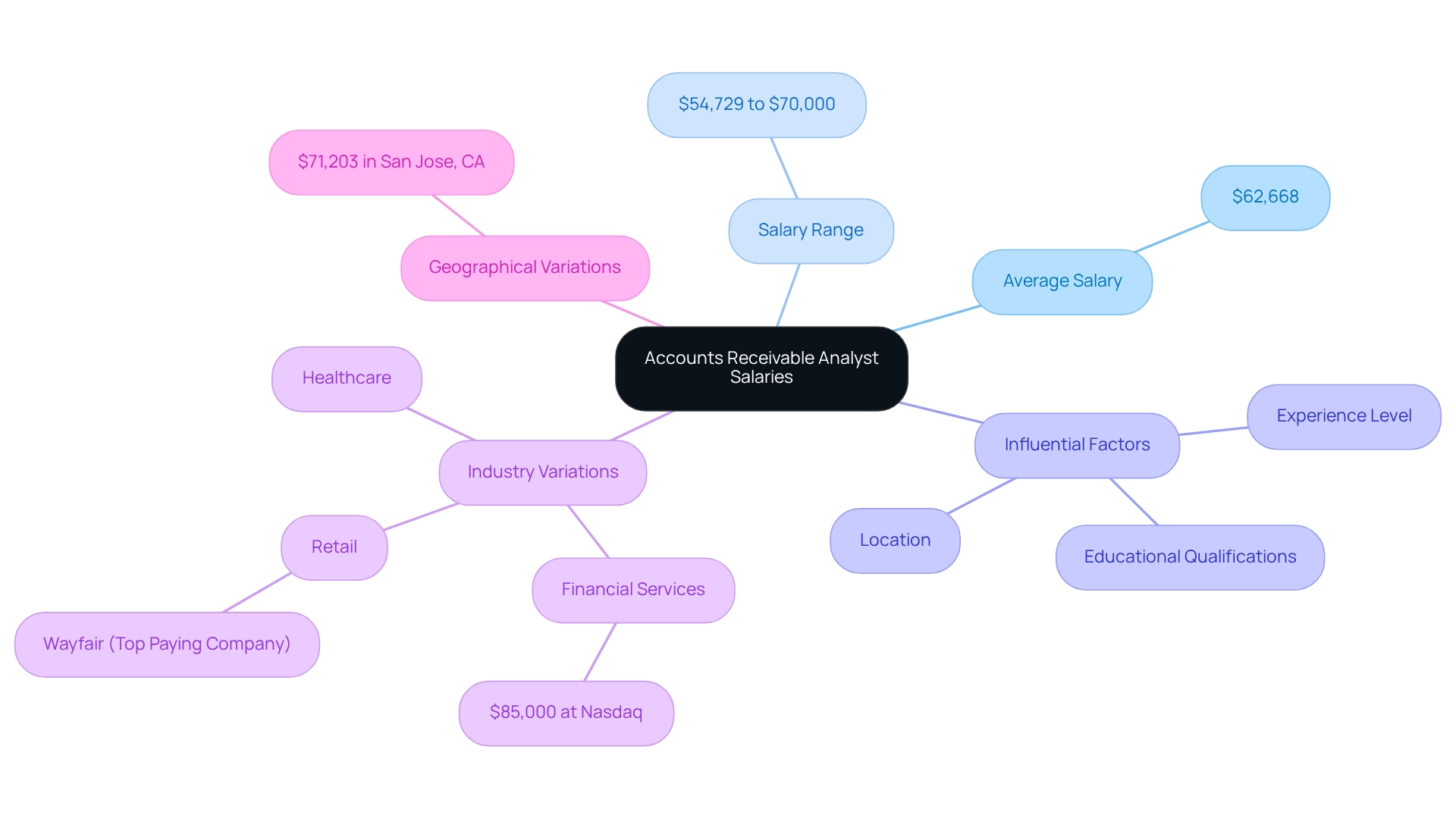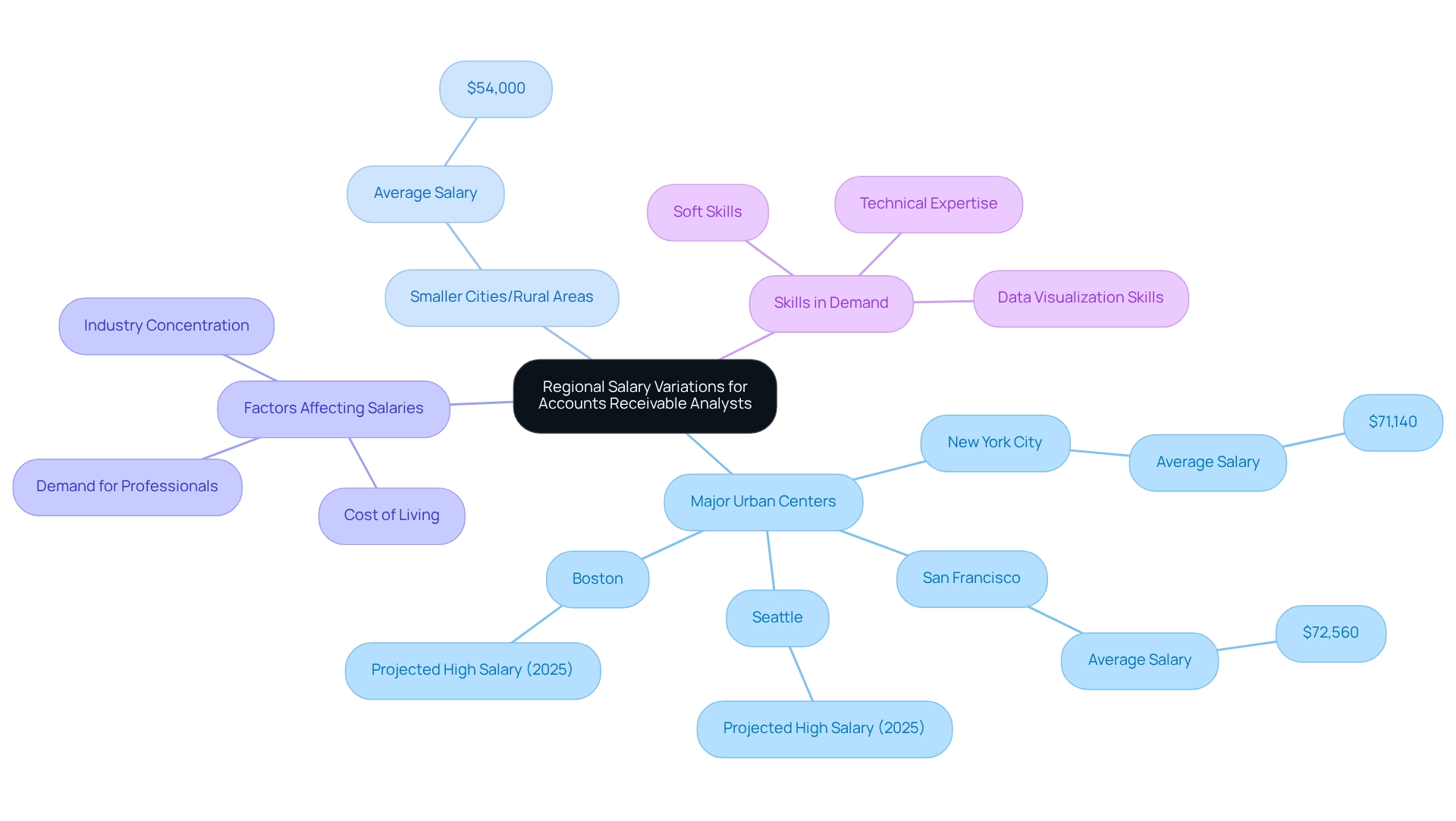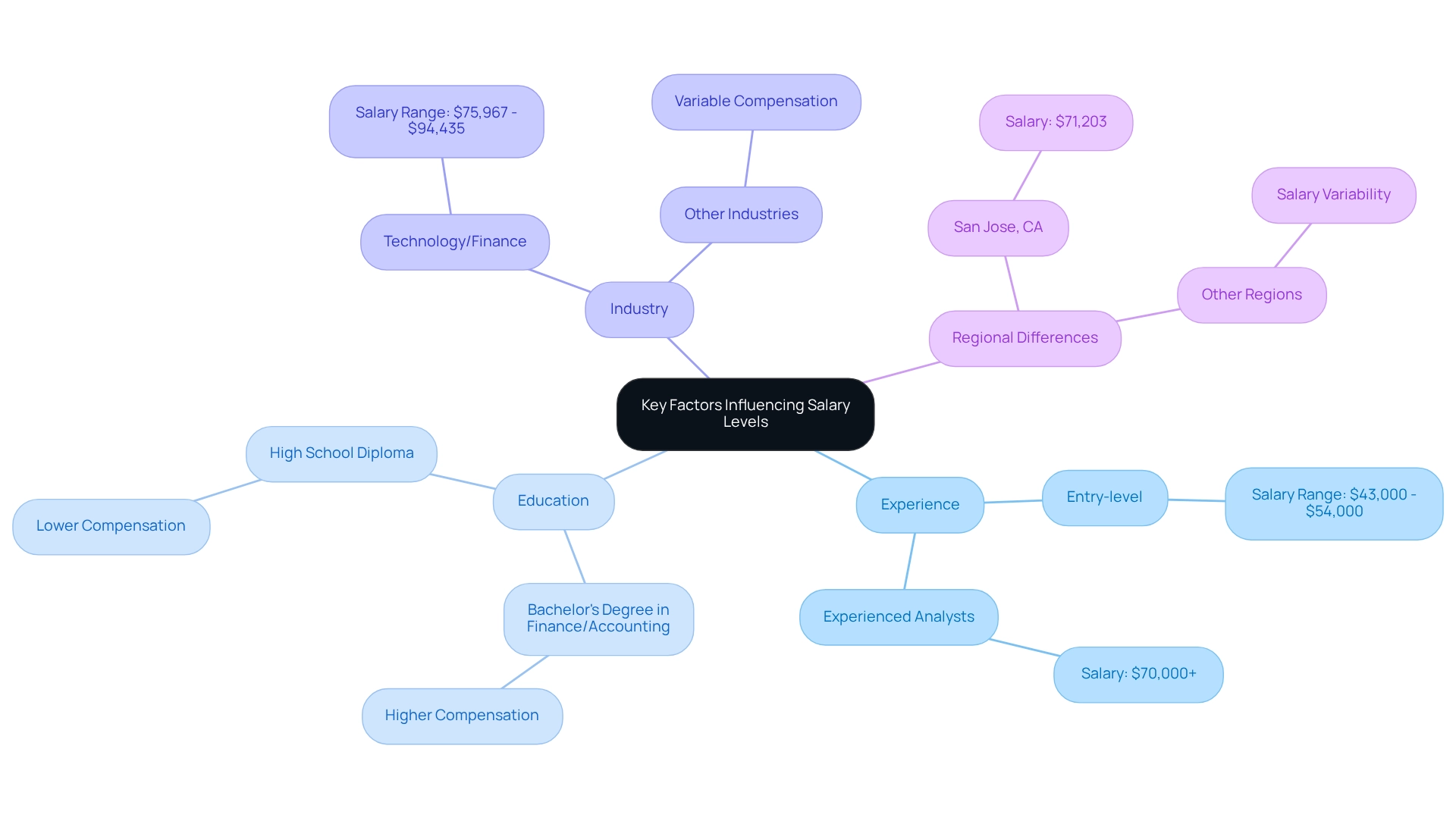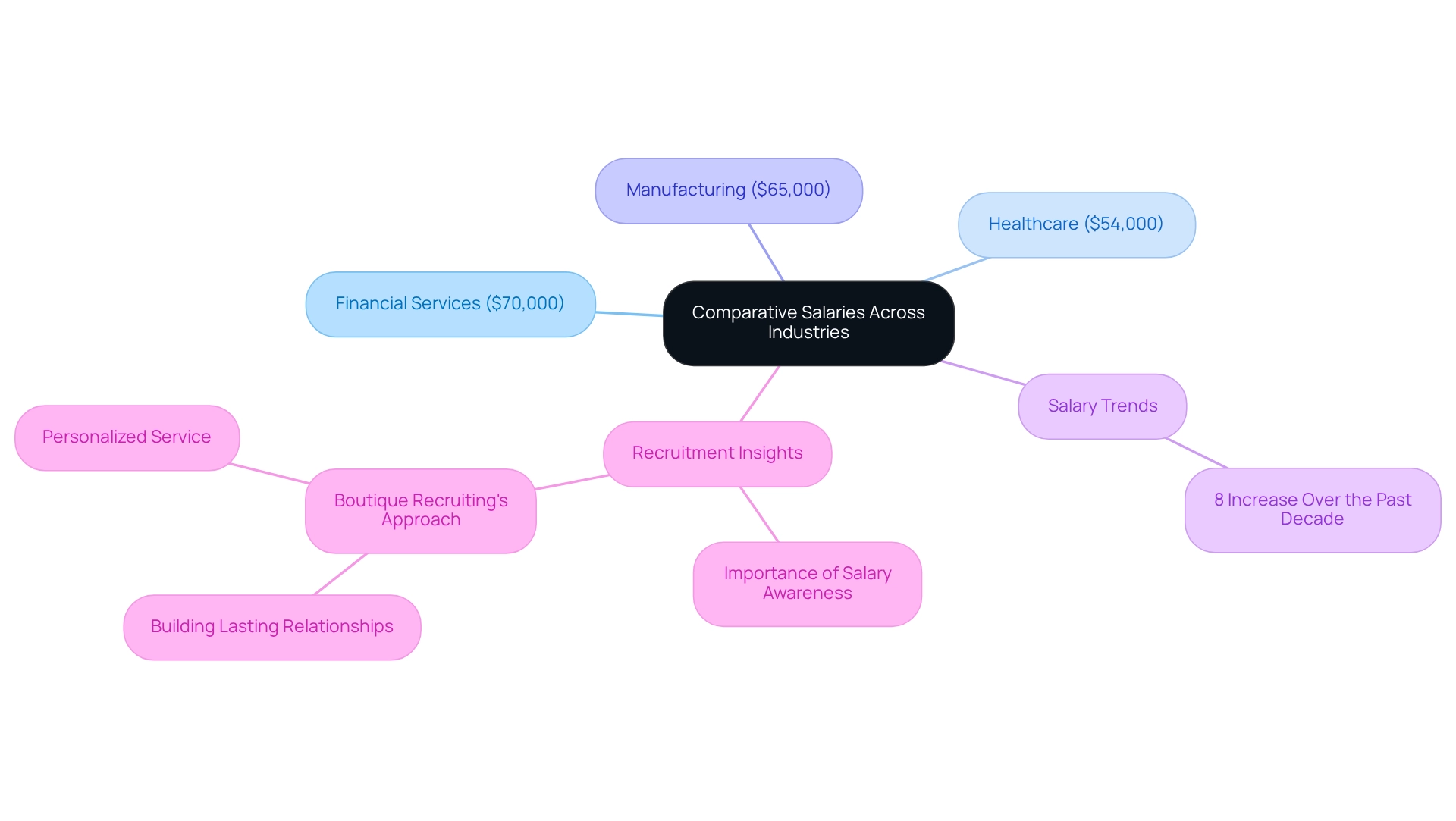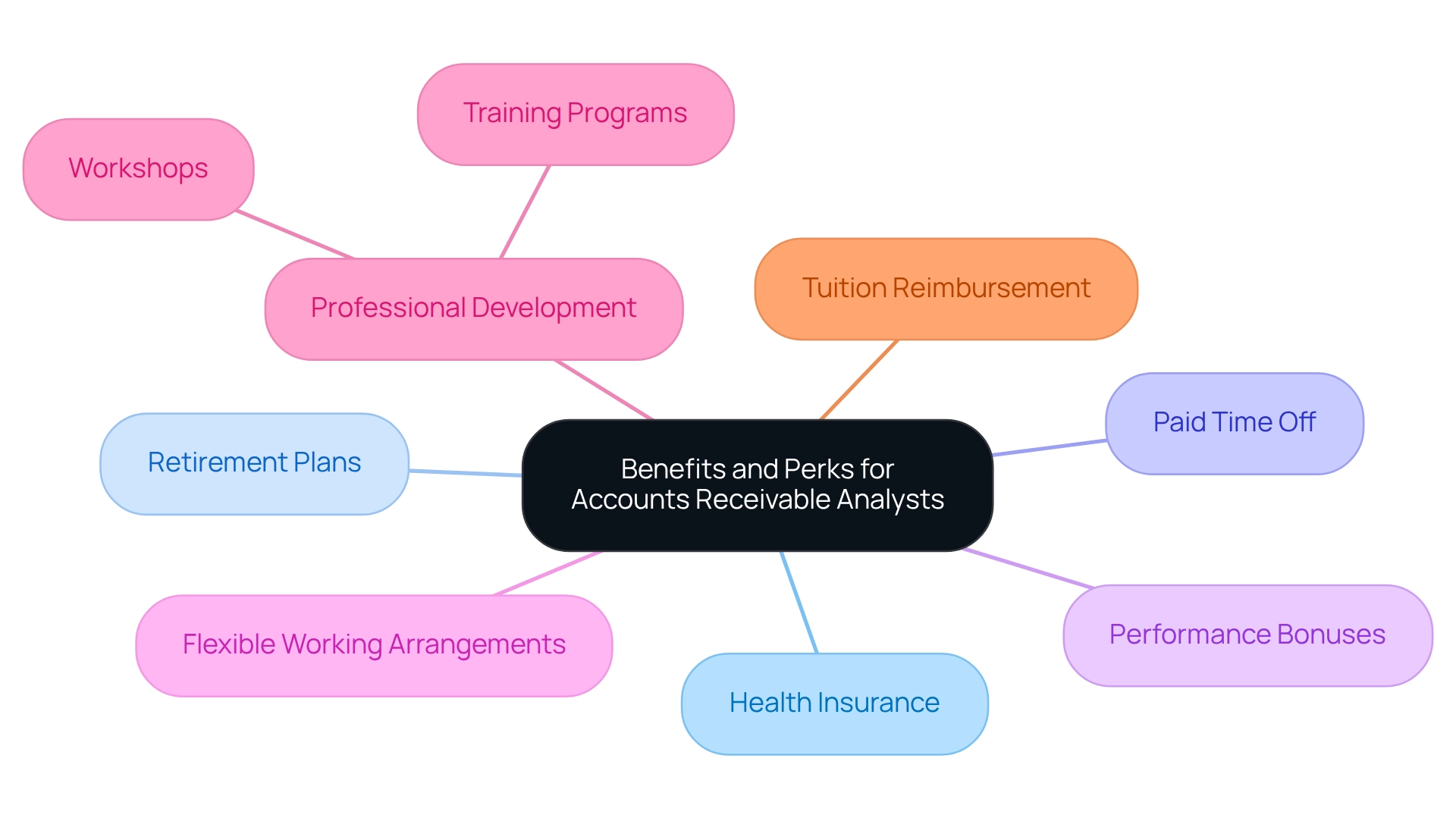Overview
The average salary for accounts receivable analysts in the U.S. is projected to reach approximately $62,668 by 2025. This figure varies significantly based on industry, experience, and location. For instance:
- Analysts in the financial services sector can earn around $70,000.
- Analysts in healthcare typically earn about $54,000.
Furthermore, factors such as certifications and regional differences play a crucial role in shaping overall compensation.
Key Highlights:
- In 2025, the average accounts receivable analyst salary in the U.S. is projected to be approximately $62,668, with a range of $54,729 to $70,000.
- Salaries vary significantly by industry, with financial services analysts earning around $70,000, while those in healthcare earn about $54,000.
- Regional variations show higher salaries in urban centers, e.g., San Jose, CA, where salaries can reach $71,203.
- Experience and education greatly influence salary levels; entry-level analysts earn between $43,000 and $54,000, while experienced professionals can earn over $70,000.
- Certifications like CMA and CPA can increase salaries by 10-20%, highlighting their value in the job market.
- Benefits such as health insurance, retirement plans, and performance bonuses are common, enhancing overall compensation.
- Negotiation strategies include researching industry standards, preparing a compelling case for salary increases, and considering benefits beyond base pay.
- The demand for skilled analysts is increasing, with a projected talent shortage intensifying competition for qualified professionals.
Introduction
In the dynamic realm of finance, the role of an Accounts Receivable Analyst has become increasingly vital—not only for sustaining cash flow but also for propelling overall organizational success. As companies endeavor to attract and retain top talent, grasping the nuances of salary trends and influencing factors is essential.
With average salaries projected to rise significantly by 2025, alongside notable regional and industry variations, this article explores the complexities of compensation for Accounts Receivable Analysts. From the impact of certifications and advanced skills to the benefits that enhance job satisfaction, the insights provided will empower both candidates and employers with the knowledge necessary to navigate this competitive field effectively.
Overview of Accounts Receivable Analyst Salaries
In 2025, the accounts receivable analyst salary in the United States is projected to average approximately $62,668 annually, typically ranging from $54,729 to $70,000. This average underscores a competitive compensation framework across diverse industries, highlighting the critical role of the accounts receivable analyst salary in financial operations. Notably, this salary can fluctuate significantly based on various determinants, including the analyst’s experience level, educational qualifications, and the specific industry in which they operate.
For example, accounts receivable analysts in the financial services sector generally earn more than their counterparts in retail or healthcare. Indeed, premier positions, such as those at Nasdaq, can offer salaries reaching up to $85,000, which illustrates the lucrative potential within this profession. Furthermore, Wayfair stands out as the leading employer in the Retail & Wholesale sector, providing a competitive accounts receivable analyst salary, which further exemplifies the competitive landscape of compensation across different industries.
Recent data reveals that the highest accounts receivable analyst salaries are found in regions like San Jose, CA, where annual compensation can soar to $71,203, according to Salary.com. This variation emphasizes the necessity for organizations to remain competitive in their salary offerings, including accounts receivable analyst salaries, to attract and retain top talent in a dynamic job market. Additionally, Boutique Recruiting’s diligent approach to understanding company culture and specific job requirements not only facilitates salary negotiations but also enhances the overall recruitment process.
By delivering targeted recruitment services tailored to accounting and marketing roles, Boutique Recruiting plays a pivotal role in navigating the talent acquisition landscape, ensuring that both candidates and employers achieve favorable outcomes in their hiring efforts.
Regional Salary Variations for Accounts Receivable Analysts
The salary of accounts receivable analysts demonstrates significant regional variation across the United States. In major urban centers, such as San Francisco and New York City, the average salary for accounts receivable analysts is notably higher, estimated at approximately $72,560 and $71,140, respectively. This trend starkly contrasts with the average earnings in smaller cities or rural areas, which hover around $54,000.
Such disparities in salary can be largely attributed to several factors, including:
- The cost of living
- The demand for financial professionals
- The concentration of industries that require accounts receivable expertise
A recent study underscores that employers in high-demand areas often offer more competitive compensation packages to attract and retain top talent. This is particularly evident in cities like Seattle and Boston, where accounts receivable analyst salaries are projected to rank among the highest in 2025, reflecting local economic conditions and a competitive job market.
Moreover, insights from industry specialists indicate a growing demand for individuals skilled in data visualization and analysis, especially in metropolitan areas where technological integration in finance is advancing. As noted by Curtis Nicholls, Ph.D., the evolving job market highlights the necessity of resilience and motivation, particularly in light of the challenges posed during the pandemic. Additionally, Dr. Nicholas Robinson, Director of Accountancy, emphasizes that “thinking of the less than the obvious answer would be the ability to ask questions the right way. If something is unclear or you just cannot figure it out, ask a question. The key part to this is TRYING to figure it out first and understanding when you are wasting your own time not getting anywhere.”
Understanding the accounts receivable analyst salary alongside these regional variations is vital for employers aiming to develop competitive compensation packages that align with market trends and attract qualified candidates. Furthermore, employers are increasingly prioritizing both technical expertise and soft skills in finance and accounting applicants, which are crucial for success in this evolving field. The rising importance of coding and data skills in the job market for Receivable Analysts further underscores the necessity for candidates to adapt and enhance their skill sets.
Key Factors Influencing Salary Levels
The salary of an accounts receivable analyst is influenced by several critical factors, including experience, education, and the specific industry in which they work. For entry-level positions, the accounts receivable analyst salary typically ranges from $43,000 to $54,000 annually. However, as analysts gain experience, their salaries can increase significantly, with seasoned professionals earning upwards of $70,000 or more.
Educational qualifications play a pivotal role in determining compensation. Analysts possessing a bachelor’s degree in finance or accounting generally earn greater compensation than those with merely a high school diploma. This trend underscores the importance attributed to formal education within the finance sector.
Moreover, industry-specific requirements can significantly influence compensation levels. For instance, accounts receivable analysts working in technology or finance sectors often receive higher compensation due to the complexity and critical nature of their roles. Recent data indicates that firms recruiting for accounts receivable analyst roles offer salaries ranging from $75,967 to $94,435 annually, illustrating the competitive environment for talented professionals in these sectors.
In San Jose, CA, the accounts receivable analyst salary for a Receivable Analyst I is noted to be $71,203, emphasizing regional pay differences.
As the employment market evolves in 2025, the influence of experience on the accounts receivable analyst salary remains substantial, with experienced analysts enjoying improved compensation and prospects. This trend is supported by findings from the Demand for Skilled Talent report, which highlights common recruitment challenges and strategies for attracting top talent in finance and accounting. Notably, 23% of organizations are hiring retired finance and accounting professionals as consultants, indicating a shift in the job market that values experience.
Employers are progressively emphasizing both technical proficiency and interpersonal abilities in applicants, which can also affect pay scales.
In this scenario, applicants should consider three essential factors when assessing job proposals:
- The initial choice may not necessarily be the most advantageous.
- It is crucial to avoid the temptation of opting for the easiest path.
- The importance of not rushing to accept a job proposal.
Exploring multiple opportunities can reveal roles that better align with their career goals and values. A well-informed decision takes time, but when the right choice is made, the feeling is incredible.
Understanding these elements is crucial for both employers and candidates navigating the changing landscape of accounts receivable analyst compensation, as emphasized by Boutique Recruiting’s Compensation Guide.
Salary Trends Over Time for Accounts Receivable Analysts
In recent years, the accounts receivable analyst salary has demonstrated a notable upward trend, underscoring the growing significance of financial management within organizations. In 2015, the average accounts receivable analyst salary was approximately $55,000, and by 2025, it is anticipated to increase significantly, indicating a growth rate of around 14% over the decade. This trend is expected to persist as businesses recognize the critical role of effective accounts receivable management in maintaining cash flow and overall financial health.
Recent compensation data reveals that the accounts receivable analyst salary for Accounts Receivable Specialists has surged by 20% since 2020, highlighting the competitive landscape for these positions. Analysts who proactively embrace new technologies and enhance their skill sets are likely to experience even more substantial income increases in the coming years. As the demand for skilled financial professionals escalates, those who can adapt to evolving industry standards will be well-positioned to seize these opportunities.
In the current job market:
- 59% of recent job postings in finance and accounting are for on-site positions
- 25% for hybrid roles
- 16% for fully remote positions
This shift underscores the importance of efficiency in financial roles, as 48% of CFOs reported that manual processes reduce their time spent with family and friends. Furthermore, a case study titled “2024 Compensation Trends for Finance Positions” suggests that senior roles, such as CFOs and VPs of Finance, typically receive larger pay raises, in contrast to junior positions facing heightened competition and potential job cuts due to AI and automation.
Boutique Recruiting specializes in linking companies with skilled individuals for positions such as CAO, Controller, and Accounts Receivable Clerk. By comprehending the compensation trends and job market dynamics, Boutique Recruiting can assist organizations in locating top talent that meets their specific requirements, ensuring they remain competitive in the evolving financial landscape. Eric Eddy from CPA Resources Global Professionals emphasized the firm’s capability to provide exceptional candidates swiftly and effectively, reinforcing the importance of skilled professionals in today’s competitive compensation landscape.
Impact of Certifications and Skills on Salary
Certifications such as the Certified Management Accountant (CMA) and Certified Public Accountant (CPA) significantly influence the salary of accounts receivable analysts. Analysts holding these qualifications typically earn compensation that is 10-20% higher than their non-certified counterparts. This disparity underscores the value employers place on certified professionals, as these credentials not only reflect a commitment to the field but also indicate a superior level of expertise.
As noted by Michael Ferrara, LinkedIn reports that profiles featuring certifications are 27% more likely to attract recruiters for higher-paying roles, further emphasizing the importance of these qualifications. In addition to certifications, proficiency in financial software, data analysis, and effective communication skills have become increasingly desirable among employers. These competencies contribute to more competitive compensation packages, reflecting the evolving demands of the industry. Continuous professional development and staying abreast of industry trends are essential strategies for analysts aiming to boost their earning potential.
Practical examples illustrate this trend: analysts with CMA or CPA certifications often report significant income increases, reinforcing the relevance of these qualifications in today’s job market. By 2025, the landscape is expected to continue evolving, with over 90% of FPAC credential holders affirming the importance of their certification in relation to their job roles. This trend highlights the growing recognition of certifications as a vital component of career advancement and enhancing the accounts receivable analyst salary.
Moreover, with forthcoming updates on minimum wage and cost-of-living indices set for April 2025, analysts should consider these factors when assessing salary expectations in the current job market. Boutique Recruiting, a trusted partner in recruitment, specializes in identifying and attracting certified professionals within the accounting sector. Their tailored recruitment services for accounting and marketing roles ensure financial firms can secure high-quality talent equipped with the necessary certifications and skills. By leveraging their expertise, Boutique Recruiting streamlines the recruitment process, facilitating the search for candidates who meet specific needs and contribute to organizational success.
Comparative Salaries Across Industries
The salary of accounts receivable analysts exhibits considerable variation across industries, reflecting the unique demands and financial structures inherent to each sector. In 2025, analysts in the financial services sector are expected to earn an average salary of around $70,000, positioning this industry as one of the highest-paying for this role. Conversely, those employed in healthcare typically earn approximately $54,000, highlighting a significant disparity that applicants should consider when evaluating job opportunities.
The manufacturing sector also provides competitive remuneration, with the accounts receivable analyst salary averaging about $65,000. This figure underscores the critical role of accounts receivable in sustaining healthy cash flow and operational efficiency within organizations. Notably, there has been an 8% increase in the accounts receivable analyst salary over the past decade, a trend that applicants should recognize as they navigate their career paths.
Understanding these pay discrepancies is vital for individuals seeking to focus their job searches effectively and negotiate salaries that align with industry standards. For instance, those transitioning from healthcare to financial services may uncover substantial opportunities for income advancement, particularly given the often higher accounts receivable analyst salary in the latter sector. Furthermore, as Eric Eddy from CPA Resources Global Professionals notes, Boutique Recruiting’s ability to swiftly and efficiently provide exceptional talent underscores the importance of grasping these income trends in recruitment.
In a competitive job market, where top candidates evaluate potential employers as rigorously as they are being assessed, staying informed about these trends empowers individuals to make strategic career decisions. This ensures they are well-positioned to secure roles that not only align with their skills but also meet their financial expectations.
Moreover, Boutique Recruiting distinguishes itself through a commitment to building enduring relationships and delivering personalized service throughout the recruitment process. This meticulous approach to understanding company culture and specific job requirements contributes to successful placements, making it an invaluable resource for HR managers aiming to attract and retain high-quality talent in this challenging landscape.
Common Benefits and Perks for Accounts Receivable Analysts
In addition to base pay, the salary of accounts receivable analysts often encompasses a variety of benefits that significantly enhance their overall compensation packages.
- Comprehensive health insurance
- Retirement plans
- Paid time off
These are common offerings, essential for employee well-being and financial security. Moreover, performance bonuses are prevalent, rewarding analysts for their contributions to the company’s success.
As we look to 2025, many organizations are acknowledging the importance of flexible working arrangements, enabling analysts to balance their professional and personal lives more effectively. Opportunities for professional development, such as training programs and workshops, are increasingly being offered, alongside tuition reimbursement programs that promote further education.
These benefits not only elevate job satisfaction but also play a crucial role in attracting and retaining top talent in a competitive job market. Consider this: a recent case study highlighted how shared access to information within accounts receivable teams led to enhanced collaboration and quicker issue resolution, ultimately benefiting employee morale and productivity. As Jordan Zenko, Senior Content Marketing Manager, aptly notes, “Transforming the workplace through strategic benefits is essential for engaging finance professionals and fostering their growth.”
Furthermore, applicants should recognize that when evaluating job proposals, it is vital to consider these advantages alongside the accounts receivable analyst salary, as they significantly impact total compensation and job satisfaction. While accepting the first job offer may seem appealing, it is essential to understand that the initial option is not always the best. Exploring multiple opportunities can unveil roles that align more closely with long-term career goals and values; committing too quickly to a job offer may lead to regret.
Boutique Recruiting’s track record of success and numerous satisfied clients underscore the importance of these benefits in cultivating a fulfilling work environment. This reinforces the notion that a well-informed decision requires time and thoughtful consideration.
Strategies for Salary Negotiation
Negotiating compensation can be a challenging endeavor, yet with the right strategies, candidates can achieve more favorable pay packages. A vital initial action is to investigate industry compensation norms for the accounts receivable analyst salary in 2025, which can offer a reference point for discussions. For instance, our data indicates that the lowest pay for an Accounts Receivable Analyst is approximately $16.13 per hour, but many professionals earn significantly more based on their experience and skills, affecting the accounts receivable analyst salary.
This benchmark is particularly relevant in light of the anticipated talent shortage of 16 to 18 million educated employees in North America and Europe, which is expected to intensify competition for skilled professionals. Candidates should keep in mind that the first job offer may not always be the best. Exploring multiple opportunities allows them to align their choices with their long-term career goals and values. It is essential to consider three key factors:
- The potential for regret from committing too quickly to a job offer
- The importance of not settling for the first offer
- The need to evaluate how well the job aligns with their career aspirations
Preparing a compelling case that justifies their request for increased compensation is essential, highlighting their unique skills, relevant experience, and potential contributions to the organization. Practicing negotiation skills is also essential; candidates should strive to keep a positive and cooperative tone during discussions, encouraging a more productive dialogue.
Furthermore, being receptive to negotiating beyond just pay can result in a more extensive compensation package. This includes discussing benefits such as flexible working hours, professional development opportunities, and performance bonuses. In fact, 68% of men and 60% of women actively negotiate their compensation, indicating that proactive negotiation is a common practice in the industry.
Real-world examples illustrate the effectiveness of these strategies. Experts in finance who have successfully negotiated their compensation often cite thorough preparation and a willingness to explore various remuneration components as key factors in their success. As the job market changes, especially with the expected talent deficit, the capacity to negotiate successfully will grow more vital for financial professionals.
In summary, applicants should arm themselves with understanding salary norms, prepare a compelling argument for their value, and be receptive to discussing various compensation factors to achieve the best possible result in their salary negotiations. Utilizing resources like Boutique Recruiting’s Salary Guide can further enhance their understanding of the competitive landscape. Additionally, candidates should remember that they are also evaluating potential employers, as the competition for top talent is fierce.
Conclusion
Understanding the salary landscape for Accounts Receivable Analysts is crucial for both candidates and employers in today’s competitive financial environment. The projected average salary of approximately $62,668 by 2025 underscores the growing value of this role, particularly as regional variations and industry-specific demands influence compensation levels. Analysts in metropolitan areas and high-demand sectors like financial services can expect significantly higher salaries, reflecting the ongoing evolution of the job market.
Key factors such as experience, education, and relevant certifications play a pivotal role in determining salary potential. Those with advanced qualifications like the CMA or CPA often earn considerably more, highlighting the importance of continuous professional development. Additionally, the increasing emphasis on technical skills, including data analysis and proficiency in financial software, further enhances earning prospects for analysts.
Beyond base salaries, benefits and perks significantly contribute to overall job satisfaction and employee retention. Organizations that offer comprehensive benefits, flexible work arrangements, and opportunities for professional growth are better positioned to attract top talent. As candidates navigate their career paths, understanding these benefits alongside salary expectations is essential for making informed decisions.
Ultimately, as the demand for skilled Accounts Receivable Analysts continues to rise, both candidates and employers must adapt to the evolving landscape. By staying informed about salary trends, negotiating effectively, and recognizing the value of certifications and skills, individuals can position themselves for success in this dynamic field. The insights provided serve as a valuable resource for navigating the complexities of compensation in accounts receivable, ensuring that both parties can achieve their goals in a competitive job market.
Frequently Asked Questions
What is the projected average salary for accounts receivable analysts in the United States in 2025?
The projected average salary for accounts receivable analysts in the United States in 2025 is approximately $62,668 annually, with a typical range between $54,729 and $70,000.
What factors can influence the salary of accounts receivable analysts?
The salary of accounts receivable analysts can fluctuate based on several factors, including the analyst’s experience level, educational qualifications, and the specific industry in which they operate.
Which industries tend to offer higher salaries for accounts receivable analysts?
Accounts receivable analysts in the financial services sector generally earn more than those in retail or healthcare. For instance, positions at Nasdaq can offer salaries reaching up to $85,000.
Where are the highest salaries for accounts receivable analysts found in the United States?
The highest salaries for accounts receivable analysts are found in regions like San Jose, CA, where annual compensation can reach up to $71,203.
How do salaries for accounts receivable analysts vary by location?
Salaries vary significantly by location, with major urban centers like San Francisco and New York City offering higher average salaries (approximately $72,560 and $71,140, respectively) compared to smaller cities or rural areas, where salaries hover around $54,000.
What are some reasons for regional salary disparities for accounts receivable analysts?
Regional salary disparities can be attributed to factors such as the cost of living, the demand for financial professionals, and the concentration of industries that require accounts receivable expertise.
What skills are increasingly important for accounts receivable analysts in the job market?
There is a growing demand for skills in data visualization and analysis, as well as coding and data skills, particularly in metropolitan areas where technological integration in finance is advancing.
What should employers consider when developing compensation packages for accounts receivable analysts?
Employers should consider regional salary variations and market trends to develop competitive compensation packages that attract and retain qualified candidates, prioritizing both technical expertise and soft skills.
